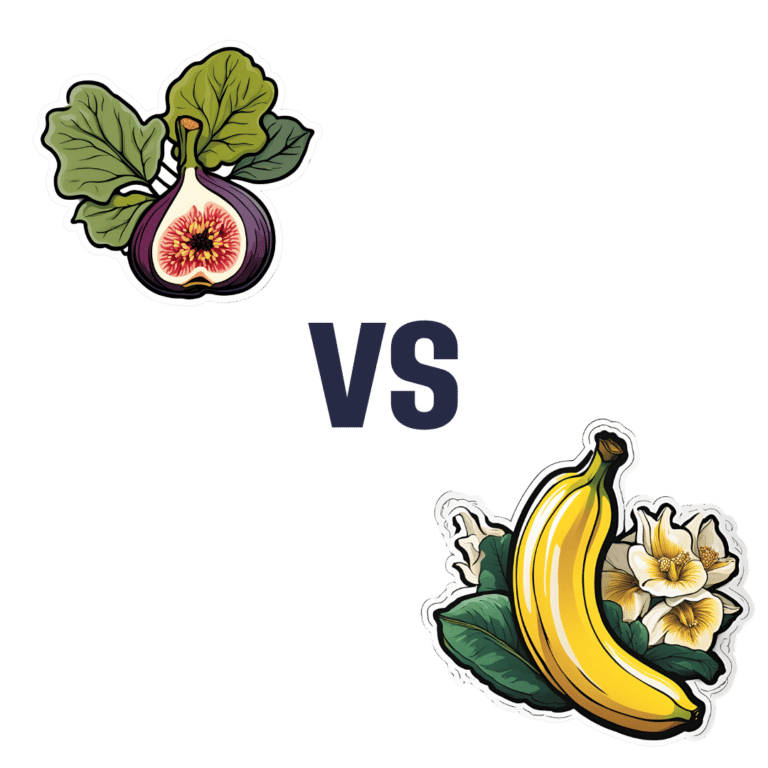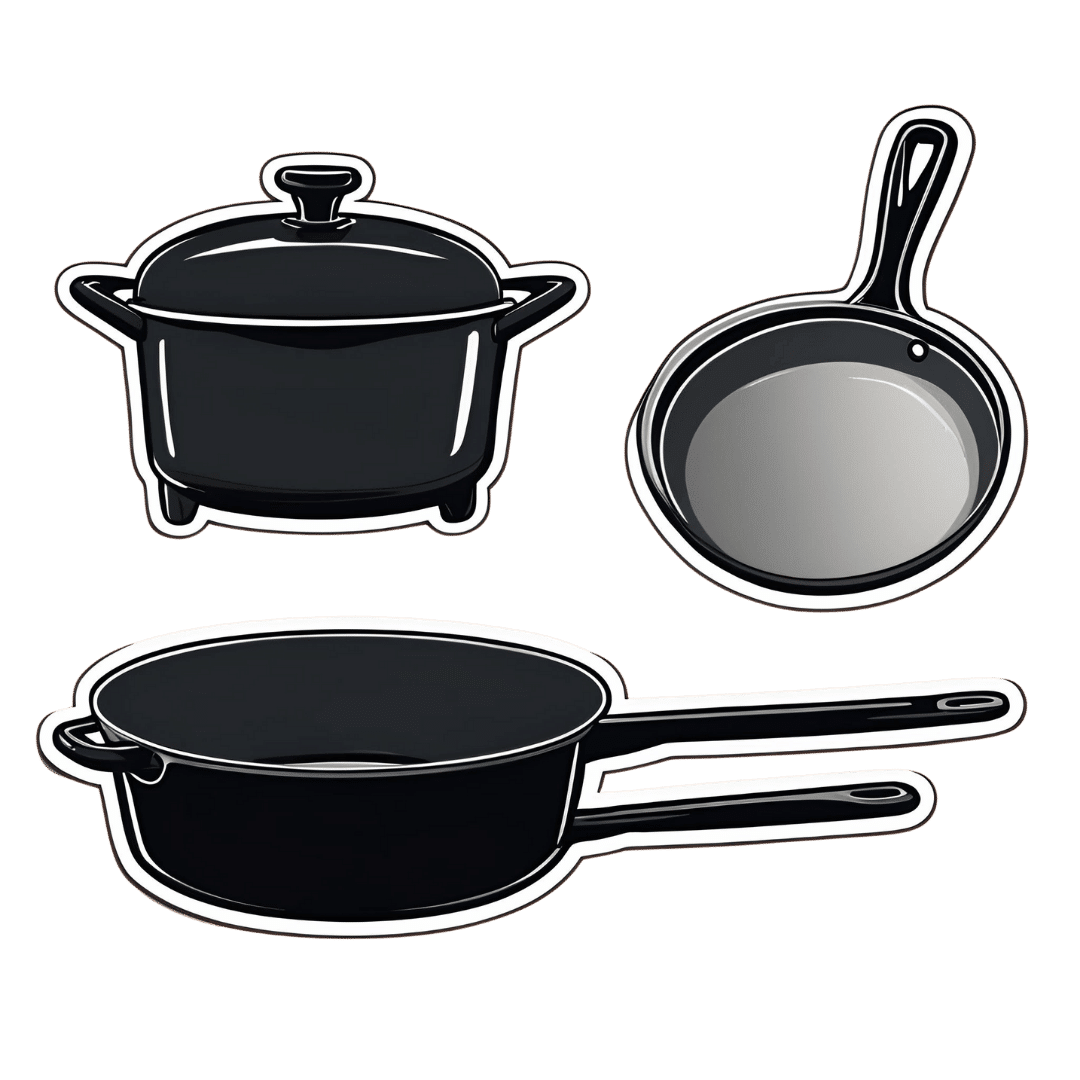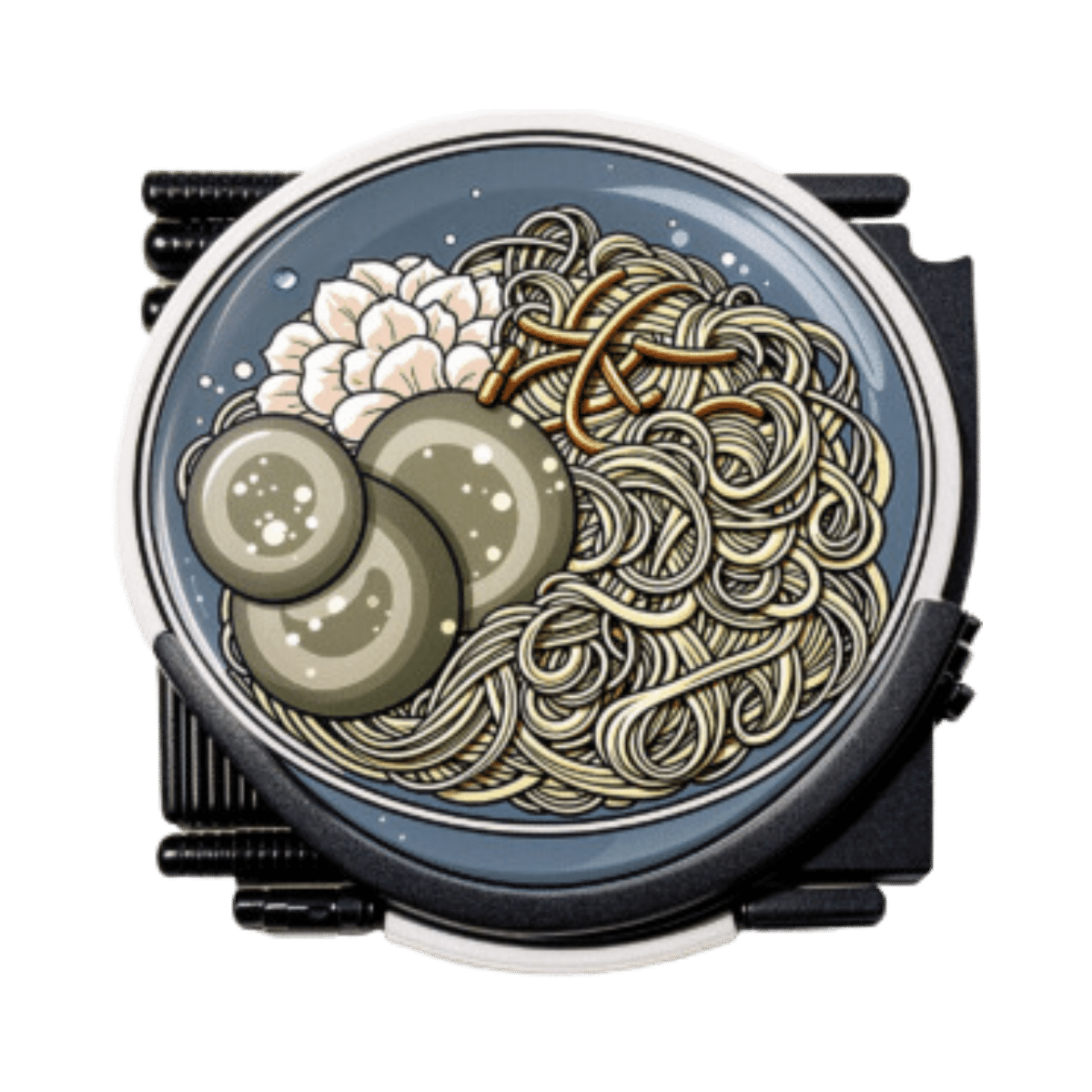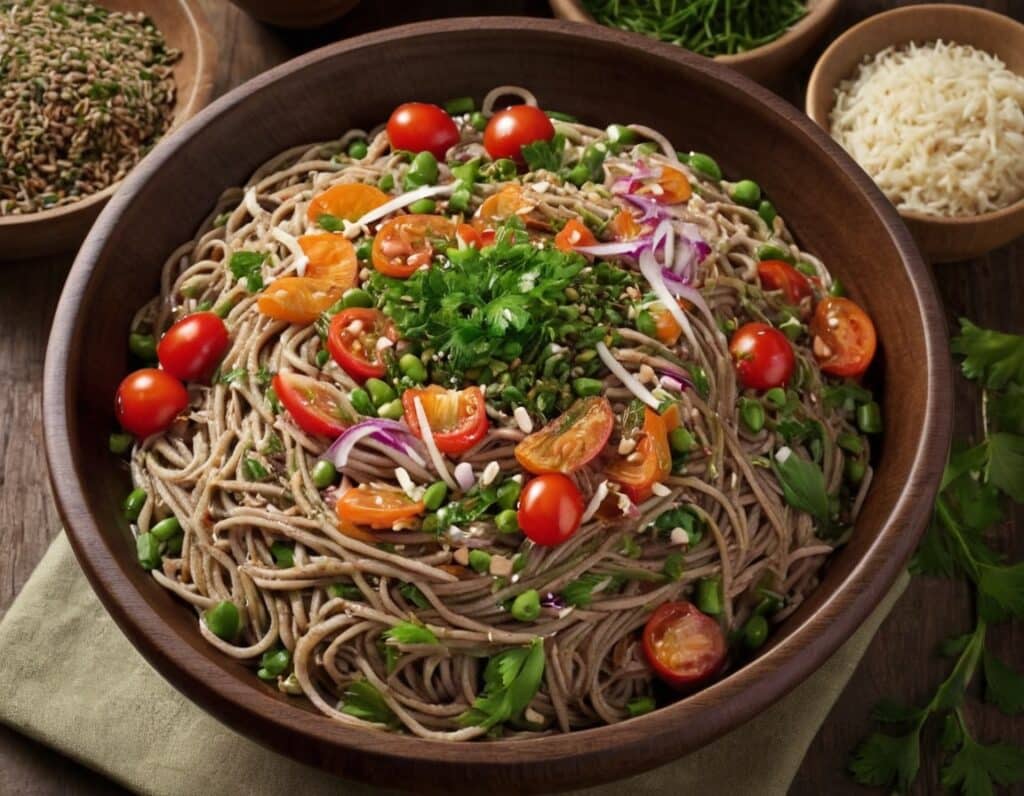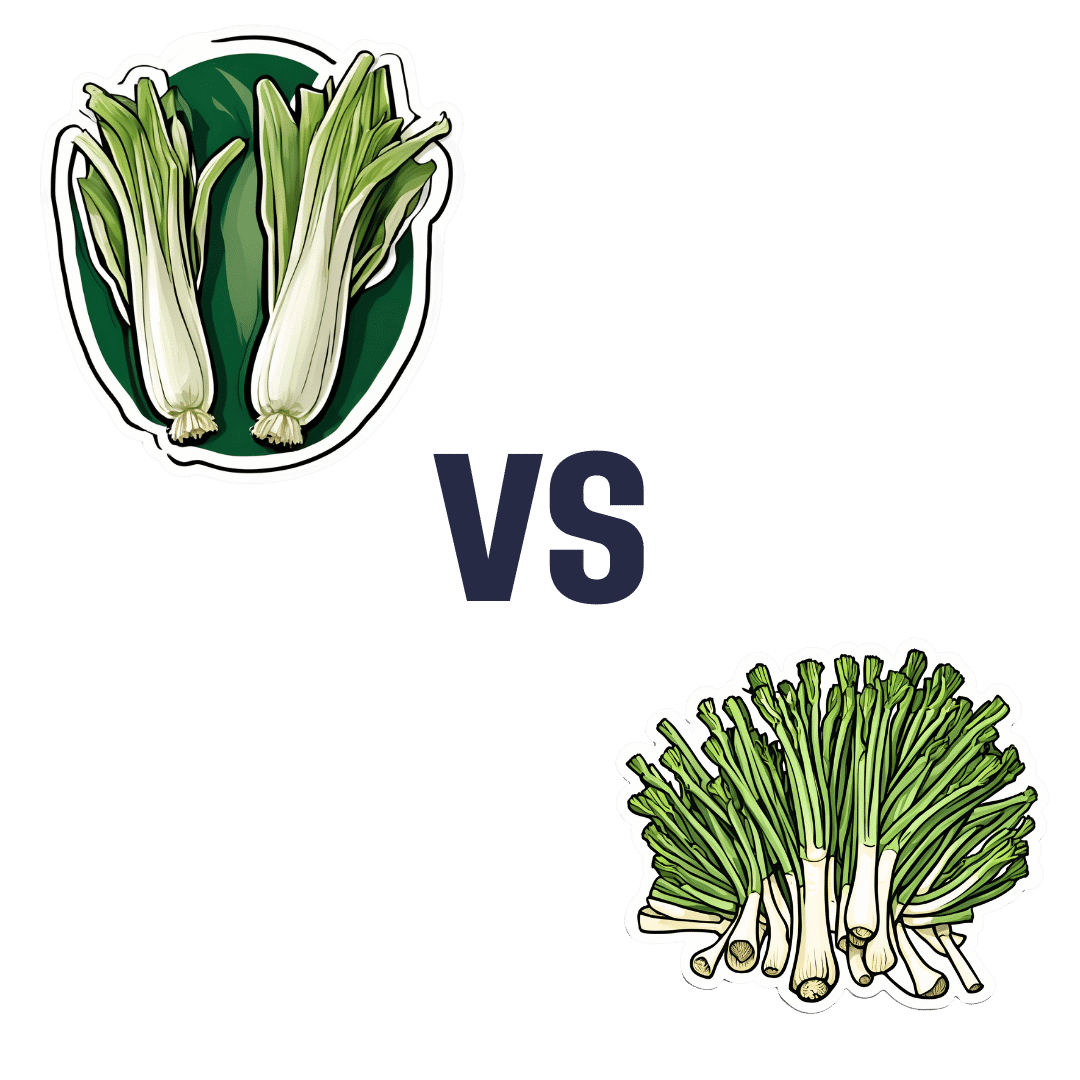
Leek vs Scallions – Which is Healthier?
10almonds is reader-supported. We may, at no cost to you, receive a portion of sales if you purchase a product through a link in this article.
Our Verdict
When comparing leek to scallions, we picked the leek.
Why?
In terms of macros, scallions might have a point: scallions have the lower glycemic index, thanks to leek having more carbs for the same amount of fiber. That said, leek already has a low glycemic index, so this is not a big deal.
When it comes to vitamins, leek has more of vitamins B1, B2, B3, B5, B6, B9, E, and choline, while scallions have more of vitamins A, C, and K. Noteworthily, a cup of chopped leek already provides the daily dose of vitamins A and K, and the difference in levels of vitamin C is minimal. All in all, an easy 8:3 win for leeks here, even without taking that into account.
In the category of minerals, leek has more calcium, copper, iron, magnesium, manganese, phosphorus, potassium, and selenium, while scallions have a little more zinc.
Both of these allium-family plants (i.e., related to garlic) have an abundance of polyphenols, especially kaempferol.
Of course, enjoy whatever goes best with your meal, but if you’re looking for nutritional density, then leek is where it’s at.
Want to learn more?
You might like to read:
The Many Health Benefits Of Garlic
Take care!
Don’t Forget…
Did you arrive here from our newsletter? Don’t forget to return to the email to continue learning!
Recommended
Learn to Age Gracefully
Join the 98k+ American women taking control of their health & aging with our 100% free (and fun!) daily emails:
-
A New Tool For Bone Regeneration
10almonds is reader-supported. We may, at no cost to you, receive a portion of sales if you purchase a product through a link in this article.
When it comes to rebuilding bones, one of the tools in the orthopedic surgeon’s toolbox is bone grafts. This involves, to oversimplify it a bit, gluing particles of bone to where bone needs rebuilding. However, this comes with problems, most notably:
- that the bone tissue and the adhesive “glue” need to be prepared separately and mixed in situ, which is fiddly, to say the least
- that the resultant mixture mixed in situ will usually be unevenly mixed, resulting in weak bonding and degradation over time
- having any more of one part or the other in any given site means that bone regeneration and adhesion become a “pick one” matter, when both are critically needed
You may be wondering: why can’t they mix them before putting them in?
And the answer is: because then either the glue will set the bone prematurely (and now we have a clump of bone outside of the body which is not what we wanted), or else the glue will have issues with setting in situ, and now we have bone tissue running down the inside of someone’s leg and setting somewhere else, which is also not what we want.
These kinds of problems may seem a little more “arts and crafts” than “orthopedic surgery”, but they are the kind of nitty-gritty real-life real challenges that actually get in the way of healing patients’ bones.
The new solution
Biomaterial research scientists have developed an injectable hydrogel (containing all the necessary ingredients* that uses light to achieve cross-linking of bone particles and mineralization without any of the above being necessary. In again oversimplified terms: they inject the hydrogel where it’s needed, and then irradiate the site with harmless visible light which instantly sets it in place. As to how the light gets in there: it’s just very shiny, like candling an egg to see inside, or like how you can still approximately see bright light even with your eyes closed.
*alginate (natural polysaccharide derived from brown algae), RGD peptide-containing mussel** adhesive protein, calcium ions, phosphonodiols, and a photoinitiator.
**unclear whether this would trigger a shellfish allergy. Probably kosher per “פיקוח נפש” and Talmud Yoma 85b, but we are a health science newsletter, not Talmudic scholars, so please talk to your Rabbi. Probably halal per Qur’an 5:4 and failing that, the same principle as previously mentioned, expressed in Qur’an 5:3 and 6:119, but once again, your humble writer here is no Mufti, so please talk to your Imam. As for if you are vegetarian or vegan, then that is for you to decide whether to take a “medications with animal ingredients are unfortunate but necessary” stance, as most do. This vegan writer would (she’d grumble about it, though, and at least try to find an acceptable alternative first).
Back to the more general practicalities…
How it works, in less oversimplified terms:
❝The coacervate-based formulation, which is immiscible in water, ensures that the hydrogel retains its shape and position after injection into the body. Upon visible light irradiation, cross-linking occurs, and amorphous calcium phosphate, which functions as a bone graft material, is simultaneously formed. This eliminates the need for separate bone grafts or adhesives, enabling the hydrogel to provide both bone regeneration and adhesion.❞
“That’s great, but I was hoping for something I can do right now, ideally at home”
If getting glued back together was not on your bucket list, that’s understandable. There’s still a lot you can do for bone density; here’s a quick overview:
- Get it checked. Yes, this first, if you haven’t already! You want a basis for comparison later. Book a bone density scan. See for example this case study with bone density scans at each end: 21% Stronger Bones in a Year at 62? Yes, It’s Possible (No Calcium Supplements Needed!)
- Enjoy a diet rich in calcium and vitamin D yes, but be aware that you can have too much of a good thing, and doing so will result in more harm than good, including (paradoxically) for your bones. See: Vitamin D + Calcium: Too Much Of A Good Thing?
- Enjoy a diet rich is phosphorus, potassium, and magnesium, which things are also necessary for bone health, and in which people are much more likely to be deficient (especially magnesium). If you’re going to supplement, then there are very big difference in the efficacy of different kinds of magnesium supplement (brace yourself; the cheapest and most common kind barely does anything at all). See: Which Magnesium? (And: When?)
- Enjoy a diet rich in high quality protein—collagen is very useful, but if you want a plant-based approach, don’t worry, our body can and will make it for yourself if you give it a hand—and vitamin C to help its absorption, as well as glycine if you’re going the no-animals route. See: Collagen For Bones: We Are Such Stuff As Fish Are Made Of and: The Sweet Truth About Glycine: Making Your Collagen Work Better
- Consider medication, if your bone density is already lower than what it should be. There are meds to stop further deterioration, and different meds to encourage your body to rebuild bone. However, there are downsides to each of them: Which Osteoporosis Medication, If Any, Is Right For You?
- While we’re on the topic of medications, consider bioidentical HRT if you are female and not otherwise producing your own estrogen and progesterone in adequate quantities to maintain your skeletal integrity: HRT: A Tale Of Two Approaches
- Look after your gut too! So much starts there: Is Your Gut Leading You Into Osteoporosis? Bacterioides Vulgatus & Bone Health
- Lastly, exercise, but exercise right, because with insufficient resistance exercise your bones will not “think” they need to remain strong, and with the wrong kind of resistance exercise, you could break/compress your bones if they are already weak, so check out: Osteoporosis & Exercises: Which To Do (And Which To Avoid)
Too much information?
If that was too much information all at once, then we recommend this as your one-stop article:
The Bare-Bones Truth About Osteoporosis
Want more information?
We are but a humble newsletter and can only include so much per day, but we highly recommend this book we reviewed a little while back, which goes into everything in a lot more detail than we can here:
Enjoy!
Share This Post
-
How extreme heat can affect you—and how you can protect yourself
10almonds is reader-supported. We may, at no cost to you, receive a portion of sales if you purchase a product through a link in this article.
Because of climate change, last summer was the hottest in the Northern Hemisphere in 2,000 years—and this summer is expected to be even hotter. The record may continue to be broken: Extreme heat is expected to become even more frequent.
The scorching heat has led to an increase in heat-related deaths in the United States, according to the Department of Health and Human Services, with approximately 2,300 deaths in the summer of 2023. Extreme heat, defined as a period of two to three days with high heat and humidity with temperatures above 90 degrees Fahrenheit, can have serious health consequences, including symptoms like headache, dizziness, loss of consciousness, nausea, and confusion.
As we face more extreme heat, you may be wondering how you can protect yourself and your loved ones. Read on to learn about heat-related illness, who’s most at risk, and more.
What happens when our bodies are exposed to extreme heat?
As our body temperature rises, our bodies attempt to cool down by opening up more blood vessels near the skin to begin sweating. The evaporation of our sweat regulates our body temperature, but it also leads to losing fluids and minerals.
When it’s too humid, sweating alone doesn’t do the trick. The heart must work harder to bring blood around the body. It starts beating faster, which can cause light-headedness, nausea, and headache.
This process can affect our health in different ways, including increasing our risk of hospitalization for heart disease, worsening asthma, and injuring kidneys due to dehydration. It can also result in heat-related illness. Below are some effects of heat on our bodies:
- Heat cramps: Occur when a person loses salt through sweating, which causes painful cramps. Symptoms begin as painful spasms after heavy sweating, usually in the legs or the stomach. Heat cramps can lead to heat exhaustion or heat stroke.
- Heat exhaustion: This occurs when the body loses an excessive amount of water and salt, usually during intense physical activity. Symptoms include irritability, heavy sweating, and weakness, including muscle cramps. Heat exhaustion can lead to heat stroke.
- Heat stroke: This is the most severe heat-related illness. It happens when the body can’t cool down and reaches a temperature of 106 Fahrenheit or higher within 10 to 15 minutes. If the person doesn’t receive emergency treatment, it can cause permanent disability or death. Symptoms include confusion, loss of consciousness, and seizures.
What should I do if someone experiences a heat-related illness?
If you or someone you’re with begins to show signs of heat illness, the Centers for Disease Control and Prevention recommends the following:
- Heat cramps: Stop all physical activity, drink water or a sports drink, move to a cool place, and wait for cramps to go away before resuming activity. If the cramps last more than an hour, you’re on a low-sodium diet, or you have heart problems, get medical help.
- Heat exhaustion: Move the person to a cool place, loosen their clothes, use a cool bath or cloths to try to lower their body temperature, and give them a sip of water. If the person throws up, or if their symptoms last longer than an hour or worsen, get medical help.
- Heat stroke: Call 911 immediately. Then, move the person to a cooler place, use cool cloths or a cool bath to help lower their temperature, and don’t give them anything to drink.
Read more about heat-related illness and what to do in each case.
Who’s more vulnerable to extreme heat?
While everyone can be affected by extreme heat, some people are more at risk, including people of color.
A 2023 KFF report outlined that because of historical residential segregation in the U.S. (known as “redlining”), people of color are more likely to live in areas that experience higher temperatures from rooftops, asphalt, and sidewalks that retain the sun’s heat (known as the “urban heat island effect”). Additionally, communities of color are more likely to live in areas with fewer trees, which act as a canopy and provide shade, making the heat worse and more direct.
Children under 5, adults 65 or over, and pregnant people are also more vulnerable to extreme heat. If you have a chronic health condition like diabetes, heart problems, or a mental health condition, you’re also at higher risk. (Some psychiatric medications, like antidepressants, can also make people more susceptible to heat).
Lastly, anyone exposed to the sun and extreme heat for long periods is also at higher risk. This includes athletes, people who work outdoors, and unhoused people.
What can I do to prevent heat-related illness during a heat wave?
During a heat wave, follow these tips to stay cool and protect yourself from heat-related illness:
- Never leave your pets or children inside a car.
- Wear loose, light-colored clothing (dark colors absorb more heat).
- Find shade if you’re outside.
- If you don’t have air conditioning in your home, go to a place where you can cool down, such as a local library, community center, local pool or splash pad, or mall. Check to see if your city has designated cooling centers. (Cities like New York have a list of places.)
- Wear a hat.
- Drink (non-alcoholic) fluids often to stay hydrated—and if you have pets, give them water frequently as well.
- Check on your family members or older neighbors who may be more sensitive to extreme heat.
- Avoid using your stove or oven too often or during the hottest parts of the day.
- Cover your windows with shades to keep the heat out.
What are some resources to prevent heat-related illness?
If you need financial assistance to cool down your home, such as to purchase an air conditioner, apply to the federal government’s Low Income Home Energy Assistance Program.
Before you head outside during a heat wave, use the CDC’s HeatRisk tool: Enter your zip code to find the current heat risk in your area and get tips on what to do to stay safe with each risk level.
During a heat wave, also look for a cooling center in your state using the National Center for Healthy Housing’s list.
Check out the National Weather Service’s for more tips and resources.
For more information, talk to your health care provider.
This article first appeared on Public Good News and is republished here under a Creative Commons license.
Share This Post
-
Aging Solo – by Ellen Dawson
10almonds is reader-supported. We may, at no cost to you, receive a portion of sales if you purchase a product through a link in this article.
Many of us will face the challenge of “aging solo”, if indeed we’re not already. The premise of this book is that while it may indeed be a challenge, it can be an exciting challenge rather than a scary one.
Thus, Dawson bids us empower ourselves to tackle it head on, proactively.
To that end, she offers her “EMPOWER” framework:
- Embrace the challenge of living solo
- Manage money mindfully while welcoming desires
- Prioritize vitality and live a vibrant life
- Own your identity; build resilience and confidence
- Weave bonds: build and maintain relationships (solo doesn’t mean lacking connections!
- Energize yourself and discover new passions
- Renew yourself and create a joyful environment
Now, as listed, those may seem a little vague, but rest assured she goes into great detail in the book, with a whole chapter for each.
For example, prioritizing vitality and energizing oneself can seem like a double-up, but the former chapter is about healthy living in the context of the solo life, while the latter chapter is more about avocation lifelong learning, overcoming fear of the unknown, and making sure to actually live this one precious life, not just go through the motions.
The style is energetic and motivational, and yet backed up with 19 pages of scientific references.
Bottom line: this book is, in essence, a roadmap for aging solo and creating the future we deserve, on our own terms. An enjoyable, practical, and uplifting read!
Click here to check out Aging Solo, and thrive as a “Soloist”!
Share This Post
Related Posts
-
The Worst Cookware Lurking In Your Kitchen (Toxicologist Explains)
10almonds is reader-supported. We may, at no cost to you, receive a portion of sales if you purchase a product through a link in this article.
Dr. Yvonne Burkart gives us a rundown of the worst offenders, and what to use instead:
Hot mess
The very worst offender is non-stick cookware, the kind with materials such as Teflon. These are the most toxic, due to PFAS chemicals.
Non-stick pans release toxic gases, leach chemicals into food, and release microplastic particles, which can accumulate in the body.
One that a lot of people don’t think about, in that category, is the humble air-fryer, which often as not has a non-stick cooking “basket”. These she describes as highly toxic, as they combine plastic, non-stick coatings, and high heat, which can release fumes and other potentially dangerous chemicals into the air and food.
You may be wondering: how bad is it? And the answer is, quite bad. PFAS chemicals are linked to infertility, hypertension in pregnancy, developmental issues in children, cancer, weakened immune systems, hormonal disruption, obesity, and intestinal inflammation.
Dr. Burkart’s top picks for doing better:
- Pure ceramic cookware: top choice for safety, particularly brands like Xtrema, which are tested for heavy metal leaching.
- Carbon steel & cast iron: durable and safe; can leach iron in acidic foods (for most people, this is a plus, but some may need to be aware of it)
- Stainless steel: lightweight and affordable but can leach nickel and chromium in acidic foods at high temperatures. Use only if nothing better is available.
And specifically as alternatives to air-fryers: glass convection ovens or stainless steel ovens are safer than conventional air fryers. The old “combination oven” can often be a good choice here.
For more on all of these, enjoy:
Click Here If The Embedded Video Doesn’t Load Automatically!
Want to learn more?
You might also like to read:
- PFAS Exposure & Cancer: The Numbers Are High
- It’s Not Fantastic To Be Plastic ← for the closely related topic of microplastics and nanoplastics
Take care!
Don’t Forget…
Did you arrive here from our newsletter? Don’t forget to return to the email to continue learning!
Learn to Age Gracefully
Join the 98k+ American women taking control of their health & aging with our 100% free (and fun!) daily emails:
-
Superfood Soba Noodle Salad
10almonds is reader-supported. We may, at no cost to you, receive a portion of sales if you purchase a product through a link in this article.
This Japanese dish is packed with nutrients and takes very little preparation time, involving only one cooked ingredient, and a healthy one at that!
You will need
- 8 oz dried soba noodles
- ½ bulb garlic, finely chopped
- 2 tbsp avocado oil
- 2 tsp soy sauce
- ¼ cucumber, cut into thin batons (don’t peel it first)
- ½ carrot, grated (don’t peel it first)
- 6 cherry tomatoes, halved (you wouldn’t peel these, right? Please don’t)
- ½ red onion, finely sliced (ok, this one you can peel first! Please do)
- 1 tbsp chia seeds
- 1 tsp crushed red chili flakes
- Garnish: fresh parsley, chopped
Method
(we suggest you read everything at least once before doing anything)
1) Cook the soba noodles (boil in water for 10 mins or until soft). Rinse with cold water (which lowers the glycemic index further, and also we want them cold anyway) and set aside.
2) Make the dressing by blending the garlic, avocado oil, and soy cauce. Set it aside.
3) Assemble the salad by thoroughly but gently mixing the noodles with the cucumber, carrot, tomatoes, and onion. Add the dressing, the chia seeds, and the chili flakes, and toss gently to combine.
4) Serve, adding the parsley garnish.
Enjoy!
Want to learn more?
For those interested in some of the science of what we have going on today:
- Rice vs Buckwheat – Which is Healthier? ← soba noodles are made from buckwheat, which by the way is also a good source of rutin, which can strengthen blood vessel walls against damage, reducing the risk of atheroma
- Cucumber Extract Beats Glucosamine & Chondroitin… At 1/135th Of The Dose?!
- Our Top 5 Spices: How Much Is Enough For Benefits?
- Chia: The Tiniest Seeds With The Most Value
Take care!
Don’t Forget…
Did you arrive here from our newsletter? Don’t forget to return to the email to continue learning!
Learn to Age Gracefully
Join the 98k+ American women taking control of their health & aging with our 100% free (and fun!) daily emails:
-
12 Foods That Fight Depression & Anxiety
10almonds is reader-supported. We may, at no cost to you, receive a portion of sales if you purchase a product through a link in this article.
Food impacts mental health, and while it won’t magically cure mental illness, dietary changes can do a lot to improve mood. Here’s how:
Nutraceuticals
We’ll not keep the 12 nutraceutical foods a mystery; here’s what they are and a few words on how they work (in many cases, we could write whole articles about them; in some cases, we already have! You can find many of them by using the search function in the top-right of each page).
- Walnuts are rich in omega-3s for brain health; arguably the best nut for depression relief.
- Fermented foods because probiotics in foods like yogurt and sauerkraut support the gut-brain connection as well as serotonin production there, enhancing mood.
- Cherry tomatoes are rich in lycopene, which helps combat both depression and mood swings.
- Leafy greens reduce brain inflammation linked to depression.
- Apples and other fruit are high in fiber and antioxidants that stabilize blood sugar and mood, reducing brain inflammation.
- Beans are high in B vitamins, crucial for neurotransmitter production and mood regulation (without also being high in brain-harmful things, as red meat is).
- Berries are super-high antioxidants and cortisol-lowering anthocyanidins, promoting calmness and reducing stress.
- Oats contain the healthiest kind of fiber, β-glucan, and additionally help stabilize blood sugar and mood; they’re also rich in selenium, which boosts mood.
- Mushrooms help regulate blood sugar and act as prebiotics, supporting serotonin production in the gut.
- Avocados are famously rich in healthy fats, including omega-3s and oleic acid, which support brain health and combat depression.
- Dark chocolate contains antioxidants, magnesium, and gut-healthy prebiotics that indirectly reduce mental stress and improve brain function. Also a famous comfort food for many, of course, and that factor’s not to be overlooked either.
- Pumpkin seeds are rich in tryptophan, which boosts serotonin production. As a bonus, they also help some kinds of antidepressant to work better—check with your doctor or pharmacist to be sure in your case, though.
For more on all of these, enjoy:
Click Here If The Embedded Video Doesn’t Load Automatically!
Want to learn more?
You might also like to read:
The 6 Pillars Of Nutritional Psychiatry
Take care!
Don’t Forget…
Did you arrive here from our newsletter? Don’t forget to return to the email to continue learning!
Learn to Age Gracefully
Join the 98k+ American women taking control of their health & aging with our 100% free (and fun!) daily emails:

